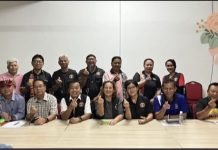KOTA KINABALU: The three Honourable Judges of the Court of Appeal unanimously dismissed the Federal Attorney-General’s (AG) appeal against granting leave (i.e., permission) to the Sabah Law Society (SLS) to proceed with a judicial review.
A statement released by Roger Chin the Immediate Past President of SLS stated that
the Court determined that SLS’s judicial review was not frivolous and should be heard on its substance before the High Court.
the Court determined that SLS’s judicial review was not frivolous and should be heard on its substance before the High Court.
Given the immense public importance of this matter, they also directed that, if the AG does not pursue it further, the substance of the judicial review be heard expeditiously before the High Court in Kota Kinabalu.
The appellate judges, Datuk Ravinthran A/L N. Paramaguru, Dato Mohd Nazlan bin Mohd Ghazali, and Dato Dr Choo Kah Sing, had earlier heard the appeal on 16 May 2024 in open court and had reserved their decision, which was delivered today via an online video hearing in the presence of Counsel for the parties.
SFC Shamsul bin Bolhassan, SFC Ahmad Hanir bin Hambaly, and FC Krishna Priya a/p Veenagopal appeared for the Federal Attorney-General. David Fung Yin Kee and Jeyan Marimuttu appeared for the Sabah Law Society (SLS). Nor Asiah binti Mohd Yusof (State Attorney-General) and Brenndon Keith Soh appeared for the State Government of Sabah.
The Court was not persuaded by the AG’s arguments that SLS lacked the threshold locus standi to bring this judicial review. Nor was the Court convinced that the decision contained in the Review Order 2022 following an Article 112D-Review was not justiciable (i.e., amenable to judicial review). They considered the historical facts that provide the factual context for this judicial review. The Court noted:
“The judicial review application concerns the Special Grant provided for Sabah under Article 112C and section 2 of Part IV of the Tenth Schedule of the Federal Constitution. The Special Grant was agreed to by all parties when Sabah, Sarawak, and Singapore formed Malaysia by signing the Malaysia Agreement 1963 on 9.7.1963 with the Federation of Malaysia and the United Kingdom. The Special Grant is subject to review under Article 112D.”
Following the legal principles laid down in recent cases decided by the Court of Appeal and Federal Court (QSR Brands Bhd (2006), Malaysian Trade Union Congress (2011), and Datuk Bandar Kuala Lumpur (2023)), the judges agreed with SLS’s argument that this judicial review is a public interest litigation.
They did not accept the AG’s argument that SLS must have a personal interest in the subject matter. The omission of the two governments to consider the period from 1974 to 2021 (48 years), referred to as the ‘Lost Years’, concerns the interpretation of provisions in the Federal Constitution, namely, Article 112C read with section 2(1) of Part IV of the Tenth Schedule and Article 112D.
SLS, a body of advocates in Sabah, did not suffer a personal wrong, but one of SLS’s objectives is “to uphold the cause of justice without regard to its own interests.” Since the payment of the 40% entitlement is from the Federation to the State of Sabah, SLS is not pursuing this case for a personal grievance but as a matter benefiting the State of Sabah and, by extension, its people.
The judges were satisfied that this is a public interest litigation. SLS was adversely affected as it has a real and genuine interest in the subject matter of the judicial review. It is not a busybody. The Court remarked:
“To shut out SLS would be a retrograde step and not consonant with the recent development of the law in this area.”
The judges were of the view that whether the duties contained in Article 112C read with section 2(1) of Part IV of the Tenth Schedule and Article 112D have been complied with are legal issues. They involve the interpretation of those provisions in the Federal Constitution, and the Court is the body that should decide whether there is any breach or unlawfulness in the governments’ performance of their constitutional duties.
SLS is not asking the Court to perform an Article 112D-Review; that is to be done by the federal and Sabah state governments in accordance with the provisions of Article 112D read with Article 112C.
The judges found this to be “a matter of high constitutional importance,” one for the Court to determine in the substantial hearing of this judicial review.
While the legal journey is still long, the first hurdle of judicial review has been crossed, and we can now proceed to the substantive hearing. SLS may provide further explanations on the Court of Appeal’s decision and outline the steps ahead as the case proceeds through the court’s due process, as and when the need arises, for the benefit of the public, Roger stated.






